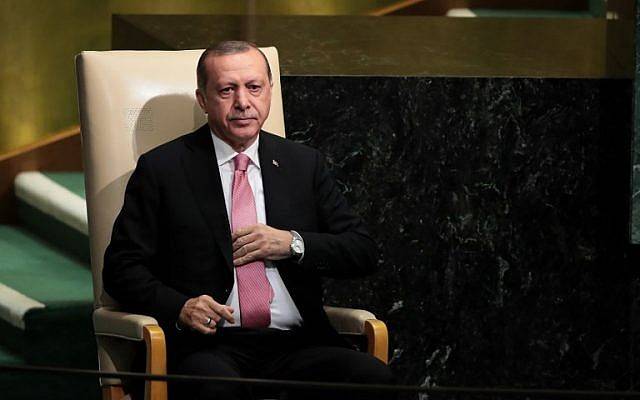Turkish President Recep Tayyip Erdogan threatened a military intervention in Iraq in response to the Iraqi Kurdish region's referendum on independence from Baghdad.
Polls opened in Iraq's Kurdish-run provinces and disputed territories as Iraqi Kurds cast ballots in support for independence from Baghdad in a historic but non-binding vote on Monday.
Millions are expected to vote across the three provinces that make up the Kurdish autonomous region, as well as residents in disputed territories areas claimed by both Baghdad and the Kurds, including the oil-rich city of Kirkuk.
The election is being carried out despite mounting regional opposition to the move. The United States (US) has warned the vote will likely destabilise the region amid the fight with the militant Islamic State (IS) group.
Baghdad has also come out strongly against the referendum, demanding that all airports and borders crossings in the Kurdish region be handed back to federal government control on Sunday.
Erdogan, speaking at a conference in the Turkish capital of Ankara as Iraqi Kurds voted in their region on Monday, said that Kurdish independence was unacceptable to his country and that this was a “matter of survival".
He pointed to Turkish military exercises currently taking place on Turkey's border with the Iraqi Kurdish region.
Erdogan said: “Our military is not (at the border) for nothing,” he said, adding that the Turkish military "could arrive suddenly one night".
Erdogan also said Turkey would take political, economic as well as military measures against Iraqi Kurds' steps toward independence and also suggested that Turkey could halt oil flows from a pipeline from northern Iraq.
“Let's see where and through which channels will they sell their oil," he challenged. "We have the valve. The moment we shut the valve, that's the end of it.”
Erdogan said a border crossing with Iraq had been closed in one direction and that Turkey would shut it entirely.
Turkish Prime Minister Binali Yildirim said his country is considering closing down its airspace as well as a border gate to northern Iraq, in response to a referendum on independence in Iraq's Kurdish region and disputed territories a vote that Turkey strongly opposes.
Yildirim also said on Monday that officers and experts from Iraq's army would join military exercises that Turkey launched along the border in an apparent warning to the Iraqi Kurds.
The Turkish premier said Ankara would from now on “enter a strong” dialogue with Baghdad, saying it regarded the central government in the Iraqi capital as the legitimate authority over border crossings, airports and oil trade in the Kurdish region.
He said Turkey had received a formal request from Baghdad requesting the closure of the airspace and border crossing.
Yildirim also suggested that Turkey would take action if the Turkmen population came under attack or if Turks encountered “obstructions or problems” at the border crossing.
'Untimely and wrong'
Iran described the Iraqi Kurdish referendum on support for independence from Baghdad as “untimely and wrong” and reiterated its support for Iraq's territorial integrity.
Foreign Ministry Spokesman Bahram Ghasemi told reporters on Monday that the vote could “lead to developments and happenings that could affect all people of the region and especially Kurdish people".
Ghasemi reiterated that Iran supports the “territorial integrity and democratic process” in Iraq.
Since Sunday, Iran's powerful Revolutionary Guard has been having a military exercise in its northwestern Kurdish region bordering Iraq in a sign of Tehran's concerns over the Iraqi Kurdish vote.
Iran's semi-official ISNA news agency reported that on Sunday that the Supreme National Security Council closed Iranian airspace to the Iraqi Kurdish area at the request of the central government in Baghdad.
Iran and Iraq have been close allies since the 2003 US-led invasion of Iraq toppled dictator Saddam Hussein. Both are opposed to Kurdish independence.
In June, the country's Supreme Leader Ayatollah Ali Khamenei told visiting Iraqi Prime Minister Haider al-Abadi, that Iraq “should remain integrated” and that advocates of Kurdish independence are “opponents of the independence and identity” of Iraq.
Referendum does not mean 'redrawing borders'
The prime minister of Iraq's northern Kurdish region said the referendum on independence doesn't mean “redrawing borders” and will not result in immediate independence.
Nechirvan Barzani said that even if the result of the vote is a “yes,” the region will resolve its disputes with Baghdad peacefully. He spoke at a press conference on Monday morning in Irabil, the Kurdish regional capital.
Voting is taking place across the region and in disputed territories claimed by both Baghdad and the Kurds, including the oil-rich city of Kirkuk.
The referendum on independence, while non-binding, has strained tensions with Baghdad and regional powers. The US has come out strongly opposed to the move, cautioning that it could distract from the ongoing fight against IS.
In Baghdad, residents strongly criticised the Iraqi Kurds' independence referendum, saying it would raise sectarian tensions and create an “Israel in Iraq.”
An Arabic newspaper headline on Monday said “Kurdistan into the unknown,” a reference to the name Kurds use for their region.
Journalist Raad Mohammad said the vote represents a “division of Iraq,” and added that it was “unacceptable for the Iraqi people as well as many other countries".
Another Baghdad resident, Ali al-Rubayah, described the referendum as a “black day in the history of the Kurds,” adding that “today, the Kurds are trying to make an Israeli state in the north of Iraq".
Lawyer Tariq al-Zubaydi said the referendum was inappropriate amid the “ongoing threat of terrorism and IS” and that a “unified country is better for all".






